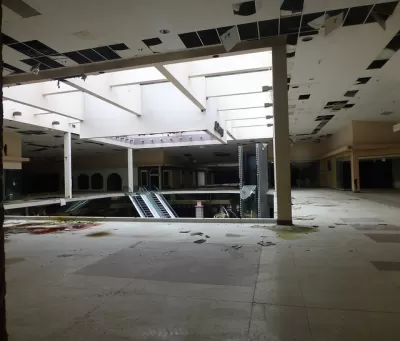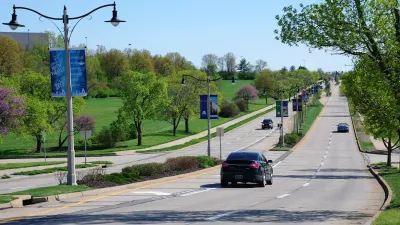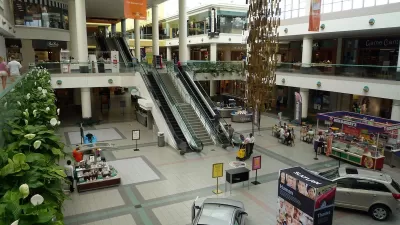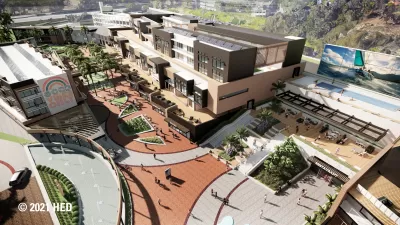Local leaders in Virginia are banking on mall redevelopment projects to revive their tax bases and create more mixed-use neighborhoods.

With traditional retail tax bases such as malls losing popularity, cities have to contend with the question of what to do with the buildings and spaces left behind. In Virginia, some city leaders are "grasping for ways to retrofit forgotten malls for urban living" in an effort to urbanize the suburbs and revitalize slumping neighborhoods. Writing in the Virginia Mercury, Wyatt Gordon reports on how cities and counties are responding to the shift in demand for commercial real estate.
Henrico County director of planning Joe Emerson says his county is working to make redevelopment of malls easier through "reworking our form-based code to put the flexibility in place for the private sector to come in and redevelop these indoor malls." To encourage redevelopment at the site of the former Regency Square Mall, "the county paid for infrastructure and roadway upgrades to incentivize the recycling of existing commercial spaces, the addition of residential units and the construction of a new sports facility to anchor the development." Emerson says "people still want that suburban lifestyle, but people also want mixed-use communities." Since malls are often situated in prime locations along busy commuter corridors, county officials hope that they will serve as ideal locations for multi-modal transit hubs.
In many cases, "redevelopment rather than retrofitting is the best way to deal with dead and dying malls. "The fantasy that a mall will be converted to a new use doesn’t often pencil out for developers," says Daniel Herriges, senior editor at Strong Towns. "These single-purpose buildings weren’t built to last 100 years in the first place so many older malls lack exterior windows and have structural problems too. It’s way cheaper to demolish the whole thing and start anew."
Herriges also warns against cosmetic changes that don't truly enhance livability or access. "Many of these retrofitted communities have the outward aesthetics of New Urbanism but are flawed in the way the community actually works and is structured. City planning offices often get shiny object syndrome — they focus all of their energy on one golden goose and ignore all the incremental changes they could make to increase prosperity across the whole locality."

Planetizen Federal Action Tracker
A weekly monitor of how Trump’s orders and actions are impacting planners and planning in America.

USGS Water Science Centers Targeted for Closure
If their work is suspended, states could lose a valuable resource for monitoring, understanding, and managing water resources.

End Human Sacrifices to the Demanding Gods of Automobile Dependency and Sprawl
The U.S. has much higher traffic fatality rates than peer countries due to automobile dependency and sprawl. Better planning can reduce these human sacrifices.

Seattle Transit Asked to Clarify Pet Policy
A major dog park near a new light rail stop is prompting calls to update and clarify rules for bringing pets on Seattle-area transit systems.

Oregon Bill Would End Bans on Manufactured Housing
The bill would prevent new developments from prohibiting mobile homes and modular housing.

Nashville Doesn’t Renew Bike Share Contract, Citing Lost Federal Funding
The city’s bike share system, operated by BCycle, could stop operating if the city doesn’t find a new source of funding.
Urban Design for Planners 1: Software Tools
This six-course series explores essential urban design concepts using open source software and equips planners with the tools they need to participate fully in the urban design process.
Planning for Universal Design
Learn the tools for implementing Universal Design in planning regulations.
City of Moorpark
City of Tustin
Tyler Technologies
City of Astoria
Transportation Research & Education Center (TREC) at Portland State University
Chaddick Institute at DePaul University
Regional Transportation Commission of Southern Nevada
Toledo-Lucas County Plan Commissions





























